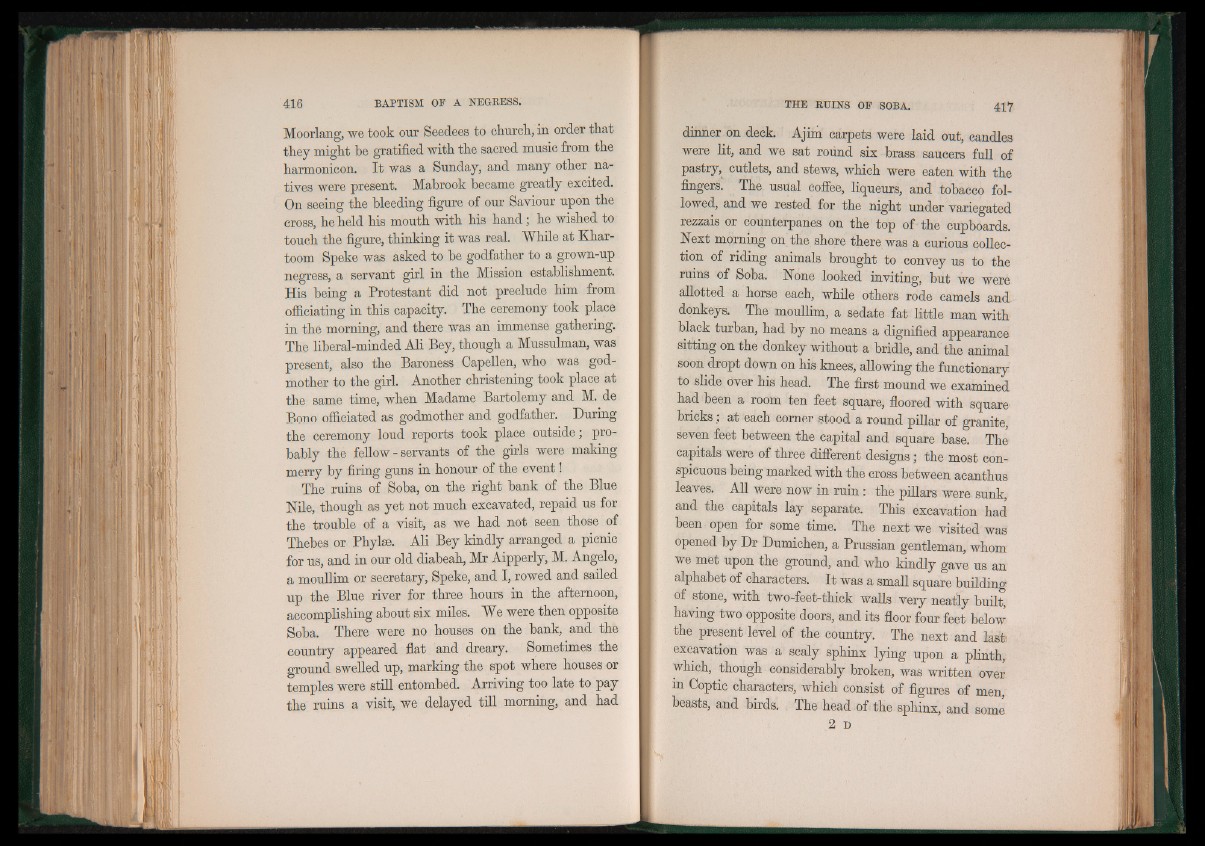
Moorlang, we took our Seedees to church., in order that
they might be gratified with the sacred music from the
harmonicon. It was a Sunday, and many other natives
were present. Mabrook became greatly excited.
On seeing the bleeding figure of our Saviour upon the
cross, he held his mouth with his hand; he wished to
touch the figure, thinking it was real. While at Khar-
toom Speke was asked to be godfather to a grown-up
negress, a servant girl in the Mission establishment.
His being a Protestant did not preclude him from
officiating in this capacity. The ceremony took place
in the morning, and there was an immense gathering.
The liberal-minded Ali Bey, though a Mussulman, was
present, also the Baroness Capellen, who was godmother
to the girl. Another christening took place at
the same time, when Madame Bartolemy and M. de
Bono officiated as godmother and godfather. During
the ceremony loud reports took place outside; probably
the fellow-servants of the girls were making
merry by firing guns in honour of the event!
The ruins of Soba, on the right bank of the Blue
Nile, though as yet not much excavated, repaid us for
the trouble of a visit, as we had not seen those of
Thebes or Phylse. Ali Bey kindly arranged a picnic
for us, and in our old diabeah, Mr Aipperly, M. Angelo,
a moullim or secretary, Speke, and I, rowed and sailed
up the Blue river for three hours in the afternoon,
accomplishing about six miles. We were then opposite
Soba. There were no houses on the bank, and the
country appeared flat and dreary. Sometimes the
ground swelled up, marking the spot where houses or
temples were still entombed. Arriving too late to pay
the ruins a visit, we delayed till morning, and had
dinner on deck. Ajim carpets were laid out, candles
were lit, and we sat round six brass saucers full of
pastry, cutlets, and stews, which were eaten with the
fingers. The usual Coffee, liqueurs, and tobacco followed,
and we rested for the night under variegated
rezzais or counterpanes on the top of the cupboards.
Next morning on the shore there was a curious collection
of riding animals brought to convey us to the
ruins of Soba. None looked inviting, but we were
allotted a horse each, while others rode camels and
donkeys. The moullim, a sedate fat little man with
black turban, had by no means a dignified appearance
sitting on the donkey without a bridle, and the animal
soon dropt down on his knees, allowing the functionary
to slide Over his head. The first mound we examined
had been a room ten feet square, floored with square
bricks, at each corner stood a round pillar of granite,
seven feet between the capital and square base. The
capitals were of three different designs; the most conspicuous
being marked with the cross between acanthus
leaves. All were now in ruin : the pillars were sunk,
and the capitals lay separate. This excavation had
been open for some time. The next we visited was
opened by Dr Dumichen, a Prussian gentleman, whom
we met upon the ground, and who kindly gave us an
alphabet of characters. It was a small square building
of stone, with two-feet-thick walls very neatly built,
having two opposite doors, and its floor four feet below
the present level of the country. The next and lash
excavation was a scaly sphinx lying upon a plinth,
which, though considerably broken, was written over
H Coptic characters, which consist of figures of men,
beasts, and birds. The head of the sphinx, and some
2 D